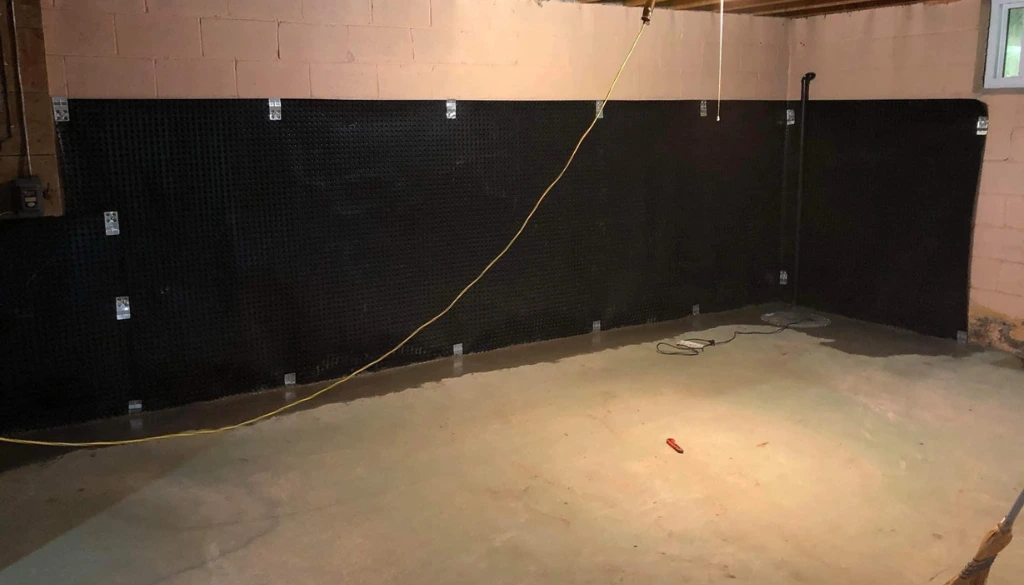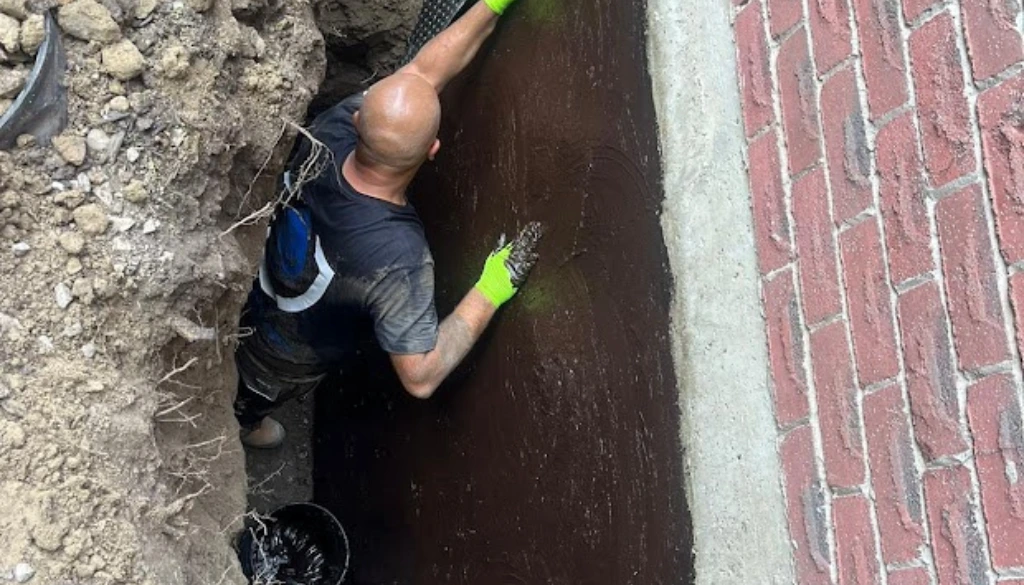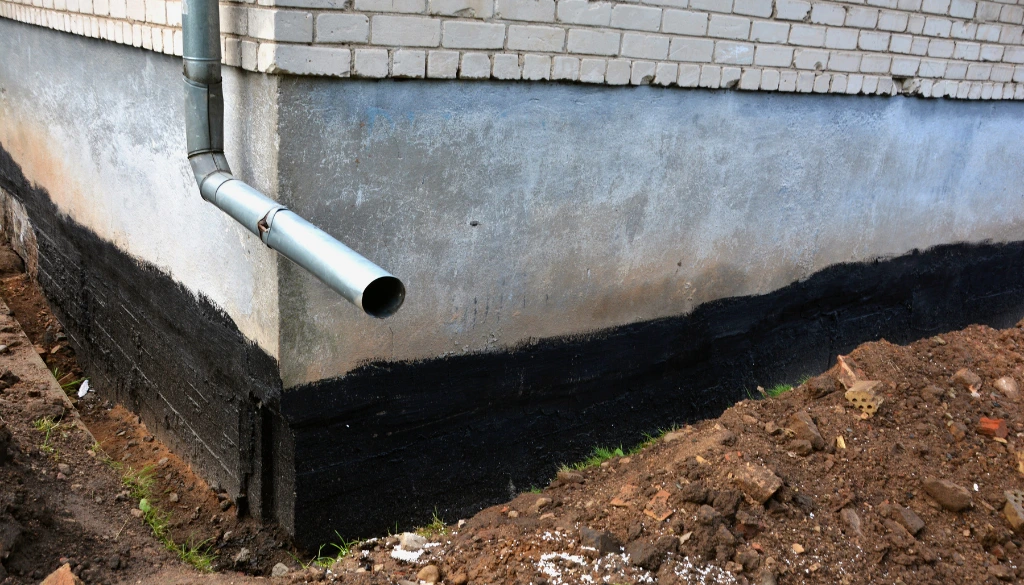Water damage repairs are one of the biggest concerns for homeowners, especially in areas prone to heavy rainfall or high water tables. Selecting the right waterproofing system – interior vs exterior – is essential to safeguarding your home. Each method offers distinct benefits and addresses specific water intrusion challenges, from managing minor leaks to providing long-term protection against severe flooding.
In this guide, we’ll break down everything you need to know about these two methods, helping you make the best decision for your home’s protection and your budget.
Table Of Contents:
What Is Interior Waterproofing?
When Are Interior Systems Recommended?
Pros
Cons
What Is Exterior Waterproofing?
When Are Exterior Systems Recommended?
Pros
Cons
Comparing Interior and Exterior Waterproofing
Which System is Best for You?
What Is Interior Waterproofing?
Interior services involve waterproofing basements from the inside to manage water that has already penetrated your basement or foundation. It is a reactive solution designed to address leaks, dampness, or condensation by redirecting water away from the interior living space.
The system typically includes:
- Drainage systems: Weeping tiles or interior drainage channels that guide water to a sump pump.
- Sump pumps: Devices that expel water outside and away from the home.
- Sealants & membranes: Applied to walls and floors to block or manage moisture.
When Are Interior Systems Recommended?
Interior systems are ideal in the following situations:
- Minor water issues: If your basement experiences occasional leaks or dampness from small cracks or condensation.
- Finished basements: Protect investments in finished living spaces by keeping the area dry.
- Limited outdoor access: Perfect for homes where excavation isn’t feasible due to close proximity to neighbouring properties or landscaping features.
- Older homes: Often used as a retrofitting solution when exterior options are too disruptive or costly.
Pros of Interior Waterproofing
- Cost-effective: Typically less expensive than exterior systems.
- Minimal disruption: Requires no excavation, preserving landscaping and property aesthetics.
- Quick installation: Often completed within a few days.
- Effective for existing moisture: Manages water already inside, preventing damage to living spaces.
- Customizable: Solutions can be tailored with sump pumps, drainage channels, and vapour barriers.
Cons of Interior Waterproofing
- Reactive approach: Does not prevent water from entering foundation walls.
- Maintenance required: Sump pumps and drainage systems need regular upkeep.
- Humidity concerns: Moisture management inside the home may lead to higher humidity levels, requiring dehumidifiers.
- Limited structural protection: Does not address hydrostatic pressure or foundation weakening.

What Is Exterior Waterproofing?
Exterior services include waterproofing basements from the outside as a preventative solution that stops water before it can enter your home. It involves treating the outer walls of the foundation to create a waterproof barrier and implementing drainage systems to channel water away.
Key components include:
- Excavation: Exposing the foundation to apply waterproof membranes.
- Sealants & membranes: Polymer-based materials are applied to the exterior walls.
- Drainage systems: Weeping tiles or French drains to redirect water.
- Backfilling with clay or gravel: Ensures proper water flow and resistance.
When Are Exterior Systems Recommended?
Exterior systems are best suited for:
- Severe water infiltration: Homes with chronic flooding or high hydrostatic pressure.
- New construction: Easier to implement during the building phase when foundations are accessible.
- Significant structural damage: Ideal for repairing and protecting foundations with large cracks or deterioration.
- High water table areas: Ensures long-term protection against persistent groundwater issues.
Pros of Exterior Waterproofing
- Proactive solution: Prevents water from entering the home altogether.
- Structural protection: Shields the foundation from hydrostatic pressure and cracks.
- Long-lasting: Requires minimal maintenance and offers durable protection.
- Enhanced property value: A strong waterproof foundation increases home appeal and resale value.
- Comprehensive barrier: Keeps both water and vapour out of the basement.
Cons of Exterior Waterproofing
- High cost: More labour-intensive and material-heavy than interior systems.
- Disruption to landscaping: Requires excavation, which may damage outdoor features.
- Weather limitations: Installation may be delayed by adverse weather conditions.
- Longer installation time: Can take one to two weeks depending on the scope of work.

Comparing Interior Vs Exterior Waterproofing
| Interior Waterproofing | Exterior Waterproofing | |
|---|---|---|
| Purpose | Manages water already inside the home. | Prevents water from entering the foundation. |
| Installation | Inside the basement, no exterior access is needed. | Outside the home, involves excavation around the foundation. |
| Effectiveness | Controls leaks and moisture but doesn’t address root causes. | tops water at its source and protects structural integrity. |
| Cost | More affordable upfront, especially for minor issues. | Higher initial cost but lower long-term maintenance. |
| Disruption | Minimal, no impact on landscaping. | Excavation disrupts landscaping and may take longer to complete. |
| Maintenance | Requires upkeep for sump pumps and drainage systems. | Minimal maintenance after installation. |
| Best For | Finished basements, older homes, minor leaks. | Chronic water issues, new construction, severe foundation damage. |
Which System is Best for You?
Choosing between an interior vs exterior basement waterproofing service depends on the severity of water issues, your home’s construction, and your budget. For minor leaks or finished basements, interior systems offer an affordable and minimally disruptive solution. If you’re dealing with chronic flooding, severe structural issues, or building a new home, exterior waterproofing provides a comprehensive, long-term fix.
At DGI Waterproofing, we specialize in both solutions and offer tailored assessments to ensure your home stays dry and secure. Contact us today for a free consultation and let us help you protect your most valuable investment.
